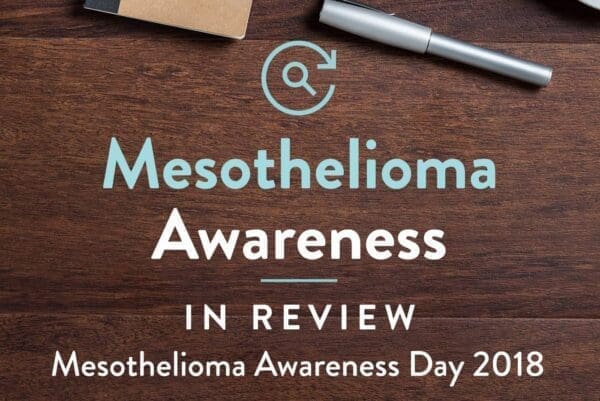
Each year on September 26, we stop to observe Mesothelioma Awareness Day, a national event building support for the mesothelioma community, patients who are battling the rare cancer, and all of the work being done to cure the disease. On this year’s Mesothelioma Awareness Day, we’re looking back at the last year to highlight medical advances and successes, along with recent developments from the Environmental Protection Agency that could have an impact in the nation’s ongoing fight to eventually phase out asbestos use.
PIPAC/PITAC Clinical Trial Benefits Peritoneal Mesothelioma Patients
In May 2018, researchers in Europe published the results of a years-long study performed using an aerosol chemotherapy called Pressurized IntraPeritoneal Aerosol Chemotherapy or Thoracal Aerosol Chemotherapy (PIPAC/PITAC). The treatment is meant for patients battling malignant peritoneal mesothelioma, and delivers targeted aerosol chemotherapy during a laparoscopy.
Early-phase results were not as favorable as current hyperthermic intraperitoneal chemotherapy (HIPEC) treatments, which have improved 5-year survival rates to at least 50%. However, patients who underwent PIPAC/PITAC extended their median survival from 12 to 26.6 months, which is a significant improvement.
A New Standard of Care?
For many years, the standard of care for mesothelioma cancer patients has been a combination of surgery, chemotherapy, and radiation. But during the American Society of Clinical Oncology Annual Meeting earlier this year, research from a phase 3 clinical trial suggested that Keytruda®, an immunotherapy drug approved to treat patients with non-small cell lung cancer, improved their survival by several months.
Keytruda®targets the PD-L1 protein, which is linked to several forms of cancer, including non-small cell lung cancer and mesothelioma. Like many immunotherapy drugs, Keytruda®blocks signals between PD-L1 and PD-1, marking them for the body’s immune system to destroy. Keytruda®and other immunotherapies have shown promise in various mesothelioma clinical trials but have yet to be FDA approved. With this study, researchers hope the combination therapy can be approved for the rare cancer and become more widely available.
New Heated Chemotherapy Combination for Pleural Mesothelioma
In August, a study was published discussing the results of a phase I clinical trial testing the safety and efficacy of a heated intraoperative chemotherapy following surgery for pleural mesothelioma. The study involved 104 patients diagnosed with stage 1 or stage 2 pleural mesothelioma. Following surgical resection, patients were treated with a heated intraoperative chemotherapy combination of two drugs, cisplatin and gemcitabine.
On average, pleural mesothelioma patients survive six months to one year with standard treatments. Researchers found this new treatment combination could extend survival to 20.3 months on average, including 10.7 months progression-free.
Pruitt Leaves the EPA, Wheeler Takes the Wheel
Environmental Protection Agency Administrator Scott Pruitt resigned from the agency in early July, following a series of potential ethical violations and other concerns about the agency’s financial mismanagement. Throughout his tenure, Pruitt was non-committal regarding the push to ban asbestos, and eventually the agency reduced its overall scope of the mineral in its risk evaluation, from encompassing millions of tons to only a few hundred. As a result, actions taken against asbestos would not be influenced by the mineral’s past usage and would only be decided based on asbestos usage in the niche chlor-alkali industry.
Taking his place was Andrew Wheeler, an experienced Washington ex-coal lobbyist who had originally started his professional life working with the EPA. Since taking over the position from Pruitt, Wheeler has largely kept a low profile and has kept the agency out of the public eye. Unfortunately, because of his vast knowledge and understanding of Washington, D.C.’s intricate political system, Wheeler’s appointment to the environmental watchdog group has asbestos advocates and environmentalists unsure what the future holds.
Public Lashes Out Against Proposed SNUR
Prior to Pruitt leaving office, the EPA issued a proposed Suggested New Use Rule, or SNUR, in an attempt to address asbestos use in the United States. However, the move was met with intense criticism by the general public and environmental groups suggested the SNUR actually made it easier for manufacturers to use asbestos in certain applications. Other critics of the proposed rule claim that other uses of the mineral in products could avoid government intervention.
During the agency’s open comment period, which ended in August, it received thousands of comments and the vast majority of them were negative. Many commenters called the SNUR dangerous and suggested that allowing any uses of asbestos should not be tolerated.
More recently, the EPA has raised other problems associated with its Asbestos Hazard Emergency Response Act (AHERA) compliance inspections. According to the EPA’s Office of Inspector General, the report found that only one of the country’s ten regions has a TSCA compliance monitoring plan, while five of the regions only performed inspections when they received tips of complaints. The report went on to suggest that every EPA region has “either completely disinvested from or significantly reduced resources to the AHERA program.”
Despite asbestos still being a major public health concern, there is hope for those who may someday be diagnosed with mesothelioma or another asbestos-related disease. Mesothelioma Awareness Day shines a light on this often fatal cancer, but it also supports the continued efforts of researchers, doctors, and organizations devoted to protecting public health. The hope is that one day there will be a cure for mesothelioma, but until then continued education and awareness are vital.




